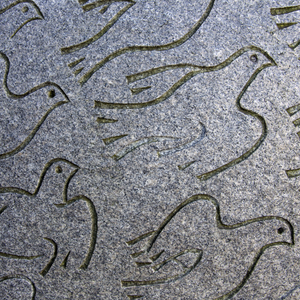
“Therefore, if you bring your gift to the altar, and there recall that your brother has anything against
you, leave your gift there at the altar, go first and be reconciled with your brother, and then come and offer your gift” (Matthew 5:23-24).
With these words, Jesus invites us to lay down the load of unforgiveness and share in his own self-emptying love—a love that harbors no grudges, pardons all transgressions and knows no bounds for all time. This is a love that, if we dare accept it for ourselves and allow ourselves to breathe it out into the world, will change our lives forever. I am writing here from experience. I can still recall a time not too long ago when the season of Lent looked very different for me. I used to relish crafting a long list of things I could give up for forty days, seeming to add on more and more each year. I would approach each Friday fast with a sense of grim self-satisfaction, occasionally taking a handful of mints to quell the increasingly violent hunger pangs that darkened my mood, tensed my shoulders, shortened my patience and most importantly (or so I thought) attested to my own enviable strength. I arrived at Yale three-and-a-half-years ago to encounter a vibrant Catholic community that, working as the hands and feet of Christ in New Haven, would show me otherwise. And I am so grateful that they did.
With their radiant kindness and sunny warmth and gentle strength, the many role models in faith that I was blessed to encounter here have exemplified for me the central point in today’s Gospel that external sacrifice derives its fulfillment only from internal transformation. They showed me how, when properly ordered, our Lenten sacrifice cultivates in us the seedlings of the same radical,
self-emptying love which Christ poured forth for us on the Cross. They inspired me to focus less on
myself during this time of abstinence and rather to ask: do our pricklings of hunger when we fast
spur us to help those facing a constant threat of food insecurity? When we attend class with ashes on our foreheads, do we grow in solidarity with those who stand out in a crowd for their differences,
who have no choice but to bear up daily against the public eye? Does celebrating the sacrament of
Reconciliation flood our hearts with gratitude towards our heavenly Father, kindle in us a desire for
healing and renewal with those who have sinned against us? Jesus makes it clear that sacrifice is
good and holy: we should offer our gifts, and offer them abundantly. But he also makes it clear that
we need the right disposition to accompany them, or we risk offering empty vessels.
At the end of today’s reading, Jesus warns his disciples that, if they do not heed this command, they
“will be thrown into prison.” I think the truth of this statement becomes immediately clear when we
think about the iron-like weight imposed on us by grudges, bitterness, hatred and hostility. Jesus
instead offers us the paradox that total surrender to the command of reconciliation in fact sets us free. If we choose otherwise, I think it is all too apparent that we find ourselves imprisoned by chains of our own fashioning. This Lent, may we choose the freedom that comes from submitting to
reconciliation and allowing the healing light of Christ-like love to guide our every footstep. May we
be like doves soaring on soft breezes to Heaven, singing praises in gentle sunlight, unencumbered by
the weight of anger and bitterness against our fellow pilgrims who, please God, will wing their way
alongside us to the heavenly kingdom.



